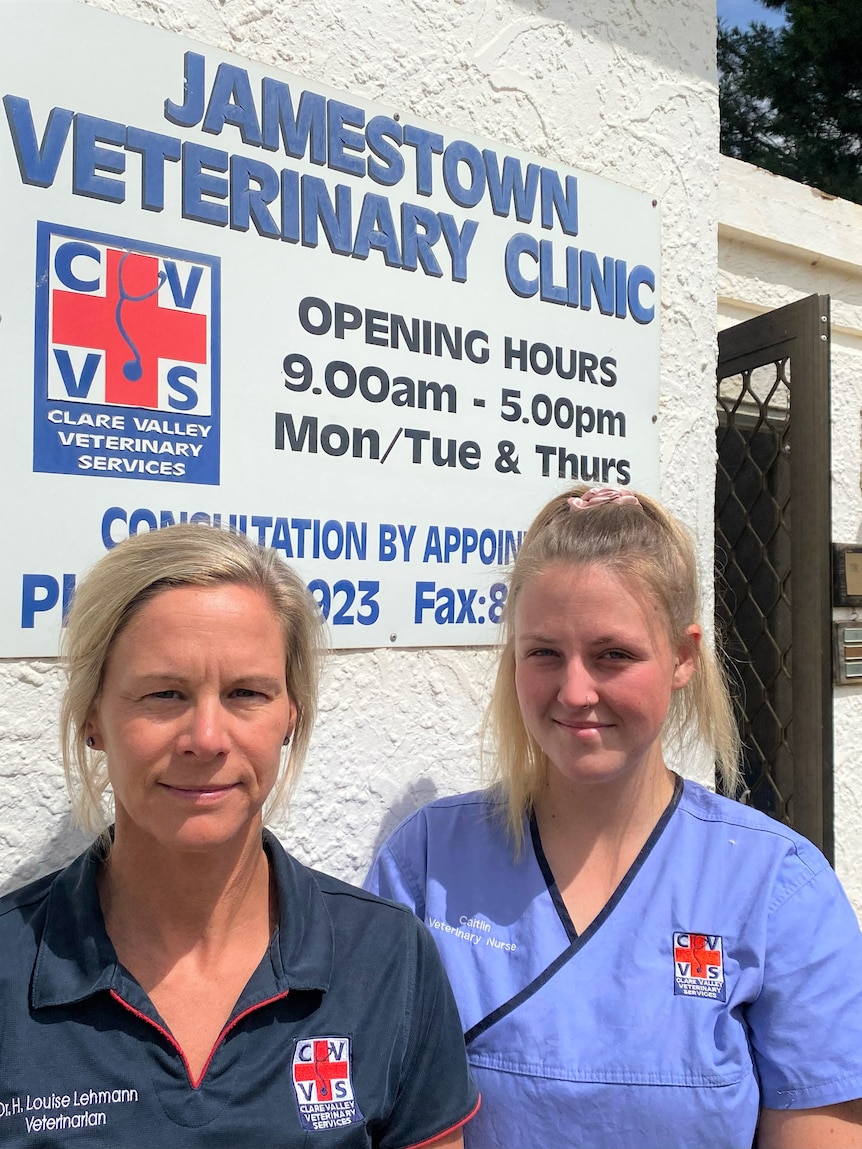The only veterinary clinic in South Australia’s mid north will close next month amid staff shortages, community backlash and online bullying.
Key points:
- A regional town in SA is set to lose its only vet when it closes next month
- The practice’s owner says the closure was due to significant community backlash
- The ongoing shortage of veterinary professionals also contributed to the decision
Clare Valley Veterinary Services announced it would close the doors of its Jamestown branch on February 3 after 16 years.
Customers will soon need to travel almost an hour to either Port Pirie or Clare to access the nearest clinic.
Veterinary surgeon Louise Lehmann, who is co-owner of the practice with her husband, said they struggled to staff the clinic over the last year due to the current shortage of veterinary industry professionals.
Dr Lehmann said vets deciding to work part-time along with sickness during the COVID pandemic added pressure to staff with an already stretched workload.
“It’s also a very emotional job but we all love our job and we’re in it to help so you tend to have a lot of empathy for clients and patients and that takes its toll mentally,” she said.
Space to play or pause, M to mute, left and right arrows to seek, up and down arrows for volume.
Community backlash
In addition to a lack of vets, Dr Lehmann said negative comments and verbal abuse from a portion of the community regarding the deregistration of another vet in Jamestown, Geoffrey Warren, also significantly aided the decision to close.
Dr Warren received a lifetime ban from veterinary practice in September when the SA Civil and Administrative Tribunal ruled his clinic was in a state of disarray and disrepair following a police investigation.
“We were falsely accused of reporting him to the authorities, which we had nothing to do with,” Dr Lehmann said.
She said while the criticism was mainly directed at her personally, it took an emotional toll on everyone at the clinic.
Some staff members did not even feel comfortable walking down the street in their uniform, she added.
“I had another girl abused at a market on Saturday when she had nothing to do with work but was wearing her uniform,” Dr Lehmann said.
“We go out there everyday trying to do our best, we’re busy, we’re putting everything in and to feel that you’re not appreciated and that we’re just out to make money, which is a lot of the comments, it just starts to wear a bit thin after a while.”
Abuse not uncommon
Australian Veterinary Association (AVA) Bronwyn Orr said a misunderstanding around veterinary fees as well as the anxiety people had for their pets’ wellbeing could contribute to verbal and online abuse.
“Obviously there’s no Medicare for pets. Veterinary care is full fee paying. There is no subsidy and unfortunately that means it can sometimes be quite expensive and people either aren’t aware or aren’t prepared for that,” Dr Orr said.
“There is a limited supply of veterinarians in this country and unfortunately if we don’t look after them it’s going to get worse and we’re going to lose more of them.”
She said while verbal abuse towards vets was not unique to regional communities, the consequences could be far worse in metro areas.
“If you push your local veterinarian out or worse, [such as] incidents of bullying that have actually led to veterinarians taking their own lives… If you do that in a regional community there is no one else around, there’s no one else to pick up those animals and help the community,” Dr Orr said.
Dr Lehmann said while she appreciated the support of long-time patients, she believed the damage to her clinic’s reputation was too far gone.
“We have a fantastic client base both in Jamestown and Clare, a lot of loyal clients who have been with us for 16 years,” she said.
“My concern was new people to the community reading those comments might not then choose to use us.”
Retaining rural vets
Dr Orr said the AVA had called on the federal government to address the national shortage of vets by establishing a Higher Education Contribution Scheme (HECS) forgiveness program for graduates who worked in remote areas.
She said it also wanted to see increased investment into rural veterinary practices, which were currently on the frontline of the shortage.
“If you don’t have enough veterinarians that can actually mean the difference between accessing veterinary services at all… so it has massive ramifications for rural communities,” Dr Orr said.
“These are people that you can really call on and rely upon when times get tough and when you lose that it actually damages the social fabric of these communities so it is really important that we make sure that we can keep and attract veterinarians to rural areas.”
Posted , updated




